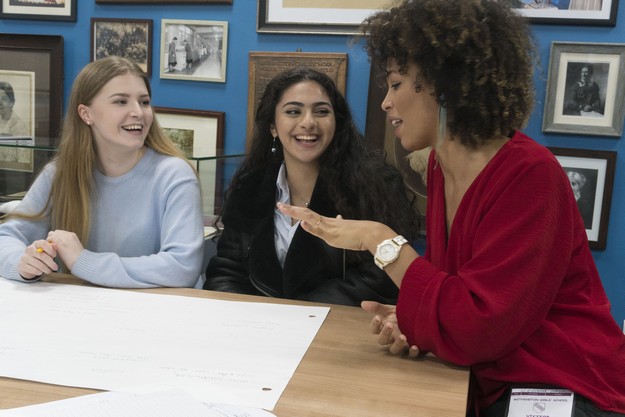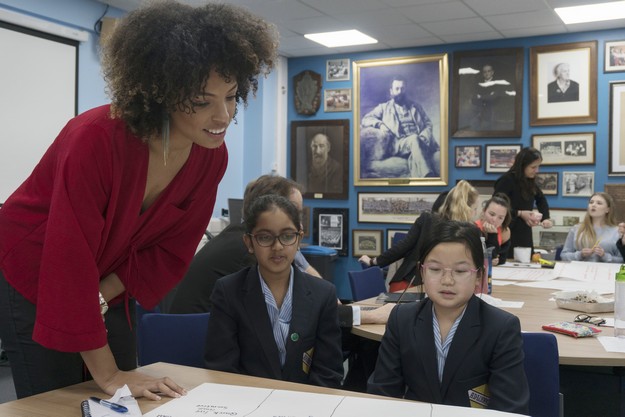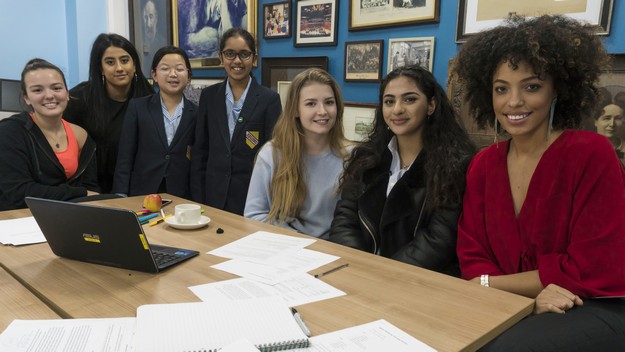Online Safety and Digital Wellbeing
To mark international Safer Internet Day 2018 Withington held a series of events aimed at further improving digital wellbeing for pupils, culminating in an informative presentation for parents on online safety.
Withington has already been working closely with Digital Awareness UK and Childnet to help its school community better understand both the implications of living life online – but in support of the global Safer Internet initiative, it ran a two-day series of talks for girls, parents, staff and neighbouring primary schools.

“Like many schools, we have taught and practised e-safety for a number of years here at Withington but in 2017, we felt the time was right to develop this further and introduce a digital wellbeing strategy that would ensure outstanding support for pupils and staff in our digital age,” explains Withington’s Deputy Head and pastoral care lead, Ms Jen Baylis.
“Recognising the extent to which digital technology matters to pupils is at the heart of our digital wellbeing strategy, which addresses not just the specific safety aspects of this app or that image, but explores the wider implications for our pupils of a life lived online.”
Ms Baylis explained that a Digital Wellbeing Team, made up of staff from across the school as well as Year 6 and Year 13 pupils, was set up in 2017. “Year 13 pupils became ‘e-peer supporters’ and were trained to deliver special sessions with younger pupils, and Year 6 pupils assisted them with this in the Junior School.”
With today’s increasing challenges of digital addiction, cyber bullying and privacy issues, the WGS Digital Wellbeing team, aided by Digital Awareness UK, celebrated Safer Internet Day by leading presentations and Q and A sessions on a variety of topics including insights into the most popular apps and websites and how they work; feedback on critical issues that have emerged both nationally and in discussions with WGS pupils throughout the year; and advice as to how children can be protected from online risk. A training session was also held for staff.

After spending two days at Withington, co-founder of Digital Awareness UK, Charlotte Robertson, who works with schools every day inspiring young people to be safe and responsible online, commented: “Withington Girls’ School have made a remarkable commitment to proactively supporting their students with the challenges of a life online and have created a culture of openness and effective student engagement at a level which we don’t often see in schools. The students will benefit hugely from the fantastic work that is happening and we look forward to following their progress.”
Girls have already benefited from a visit from an anti-cyber bullying bus last term as well as having lessons delivered as part of their IT and PSHCE curriculums. Additional sessions with Childnet are planned later in the term.
Safer Internet Day is part of a global drive to ‘create, connect and share respect’ on the internet and Withington’s participation reinforces the School’s commitment to ensuring its girls are safe, happy and in control when they are online. As part of its digital wellbeing strategy, girls and staff have worked closely together to devise an engaging programme that has opened up wide-ranging conversations in School around digital awareness, whilst also providing practical solutions to help girls navigate the issues they can face.
Research across the year groups by Sixth Formers identified specific concerns – and pupil workshops, led by a specially trained team of Year 13 and Year 6 e-peer supporters, are now held regularly throughout the year. Feedback since September from pupils and parents has been “immensely positive”, according to Ms Baylis.
“We understand how difficult it can be to ensure children are using the internet safely, especially when they are often using the internet outside of the home. From the age of five, most young people start experimenting with social media usage – whether it’s browsing YouTube videos, playing online games or sharing selfies – and much of it can feel alien to parents.
“We are passionate about technology at Withington and recognise that technological creativity and talent will be a crucial factor in careers of the future. Living in a digital world undoubtedly has many advantages for young people but a number of challenges have also emerged in recent years. We have a responsibility to ensure our pupils can use technology independently and positively and that they can recognise and manage those digital interactions that disrupt happiness and wellbeing,” she said.


